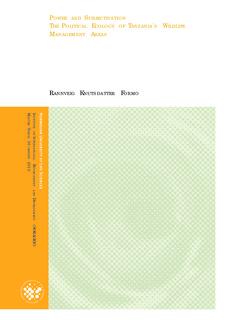Power and Subjectivation : the political ecology of Tanzania's wildlife management areas
Master thesis
Permanent lenke
http://hdl.handle.net/11250/187699Utgivelsesdato
2010-11-01Metadata
Vis full innførselSamlinger
Sammendrag
In the last few decades there has been a rise in community-based, participatory approaches to conservation and natural resource management. In Tanzania, the new conservation paradigm has to a large extent replaced the previous conservation strategy which was characterized by exclusion of local populations and strict enforcement of protected areas. The community-based approach to wildlife management was implemented in the wildlife legislation of the 1990s and, by the turn of the millennium, so called Wildlife Management Areas (WMAs) were introduced as a standard model for community-based buffer-zone management of wildlife located alongside the country’s larger national parks and game reserves.
This thesis applies a historical analytical approach to study the shift in practices and discourses of conservation from the colonial period until the present. In this, it argues that there is a strategic relationship between the politico-economic interests of particular groups of actors, the knowledge of wildlife management which at any time dominates the discourse on conservation, and the models of conservation which are adopted. After placing the development of the WMA model in a historical perspective, this thesis investigates the performance of one of Tanzania’s first WMAs: Ngarambe-Tapika WMA located in the buffer-zone of the Selous Game Reserve. The empirical findings from this research reveal several issues of interest. For one thing, while management had been successfully devolved to local level, the villagers were unable to both fully control the wildlife use within their area and reap a substantial part of the benefits from tourist hunting. With the empirical findings as a starting point, this thesis applies some Foucauldian concepts and investigates the way in which the WMA regime encourages the production of environmental subjects. In this, the thesis argues that the WMA model does not represent any radical structural change to the way conservation is practiced; rather, it can be understood as a non-coercive instrument of power through which the conservation interests of dominant actors are achieved.
Beskrivelse
This thesis is concerned with the development of Tanzania’s Wildlife Management Areas (WMAs) and the performance of Ngarambe-Tapika WMA located in Rufiji District in the southeastern part of the country. The thesis is written within the theoretical and conceptual framework of political ecology and influenced by similar critical approaches to conservation practice and discourse. While much secondary data is used, equal emphasis is placed on primary data collected from fieldwork in Tanzania in the fall of 2009.
